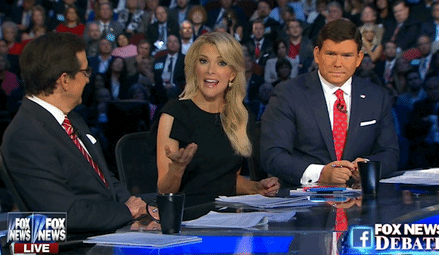One of the most cowardly ways for a presidential candidate to answer a public debate question like "Do you have a word from God?" is by saying yes. Why? Because the most courageous thing a candidate can do, for once, is remind Americans that "no religious test shall ever be required as a qualification to any office or public trust under the United States." It's right there in those little pocket Constitutions so many of the candidates are fond of pulling out and waving around, particularly when trying to make points about why we need more guns or less government.
If, say, such a candidate were feeling especially bold, they could go on to point out that America is home to hundreds of religious groups and traditions, not to mention the 22.8 percent of Americans that identify as religiously unaffiliated (the "nones"). After all, if elected, this candidate would be tasked with representing the best interests of our marvelous, diverse, and pluralistic society.
But the 2016 Republican presidential hopefuls are not likely to take such a stand, since 69 percent of Republican voters--and 46 percent of Democrats--continue to believe that being Christian is an important part of being "truly" American.
So, writing specifically from the Christian tradition--which the current slate of potential nominees claim to share--I would like to take a moment to offer just two words from God that these candidates might like to bear in mind.
First, God could not care less about a candidate's personal Christian "witness" while people go hungry, war hawks favor drones over diplomacy, unarmed black people are gunned down in the streets, and reckless politicians brag over who is the best at denying desperately needed healthcare to vulnerable women, men, and their families. My bible says that I'm required to "do justice, love kindness, and walk humbly" with God (Micah 6:8). It also tells me that God is coming for those "who afflict the righteous, who take a bribe, and push aside the needy in the gate" (Amos 5:12). Piety means very little without social and economic justice. Says God, anyway.
Second, despite repeated referrals in the GOP debate to God as a "guy," "he," and "him," the Christian and Jewish scriptural traditions have long pushed the gender boundaries of language for God. Why does this matter? In our culture, talking about gender rapidly draws many of us to conversations about God. And talking about God means talking about power. These candidates are seeking an office that many regard as the most powerful seat of governance in the world.
Too often, God has been wielded by many of these candidates as a weapon in ways that carry very real consequences for sexual minorities, for women, for the poor, and for the environment. Opening up how we talk about God--both by expanding our gendered language and going beyond it--offers a far richer understanding of what it might mean to have a "word from God."
The Hebrew scriptures (also contained within what Christians call the Old Testament) offer imagery of God as a comforting mother, a mother bear, a mother eagle, a nursing mother, a mother in labor, and a woman speaking to her employer. The Christian New Testament gives images of God as a woman looking for her lost coin and a mother hen seeking to gather up her chicks. And God can also be the father who receives a wayward son with tenderness and kindness, as in the narrative of the prodigal son. The whole slate of potential nominees might also find it useful to recall Genesis 1:27, in which both men and women are created in the image of God.
The images I mention above are just the beginning of a rich diversity of imagery for God that include images that transcend the idea of God as a dude (or dudette) altogether. Gender is not one thing or the other, and neither is God.
In the Christian and Hebrew scriptures, God is also a wisdom spirit, a breath of air, and more. And the multiplicity of religious traditions in the United States includes many other traditions with many other ways of approaching the concept of God. Islam--a religion which shuns pictorial depictions of God--offers us 99 names that include The Exceedingly Merciful Compassionate and The Gentle. Hinduism offers literally thousands of manifestations of the divine. Buddhism generally appeals to ideas of divine connection and consciousness over a belief in a personal God. But at the end of the day, the language that helps the religious describe and encounter the divine cannot be equated with precisely who and what the holy is.
And bellicose, mean, and dangerous political words are not drawing many of these candidates any closer to the word of God or the diverse religious reality of the country they so desperately want to lead.
Carolyn J. Davis is the Policy Analyst for the Faith and Progressive Policy Initiative at the Center for American Progress and an ordained minister in The United Methodist Church. Follow her on Twitter at @carojdavis.

